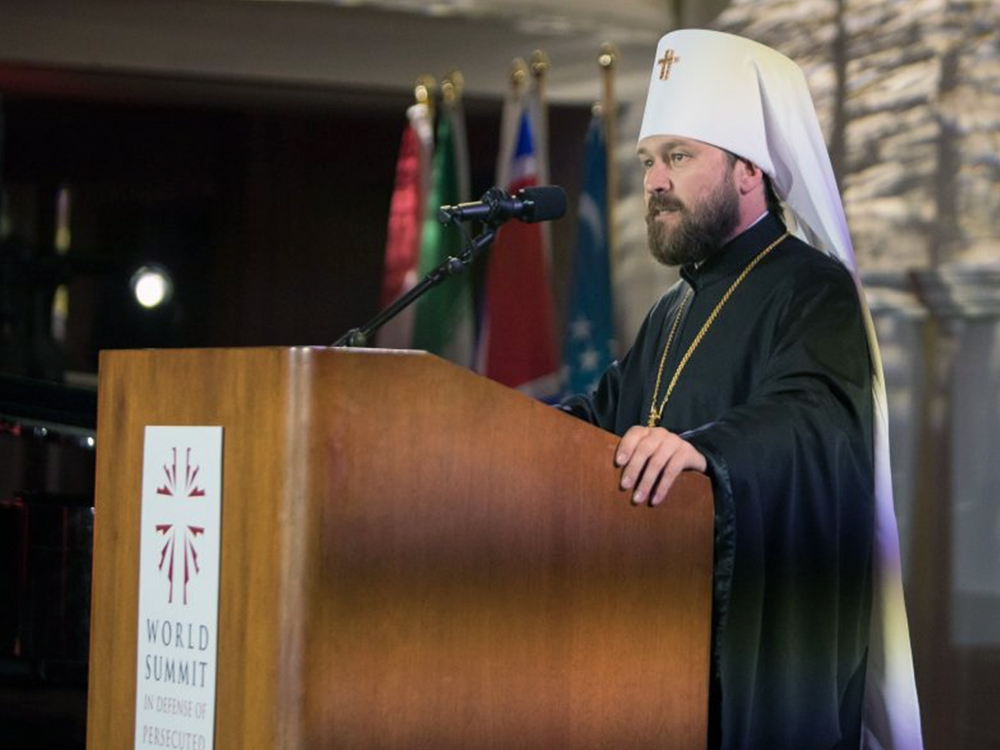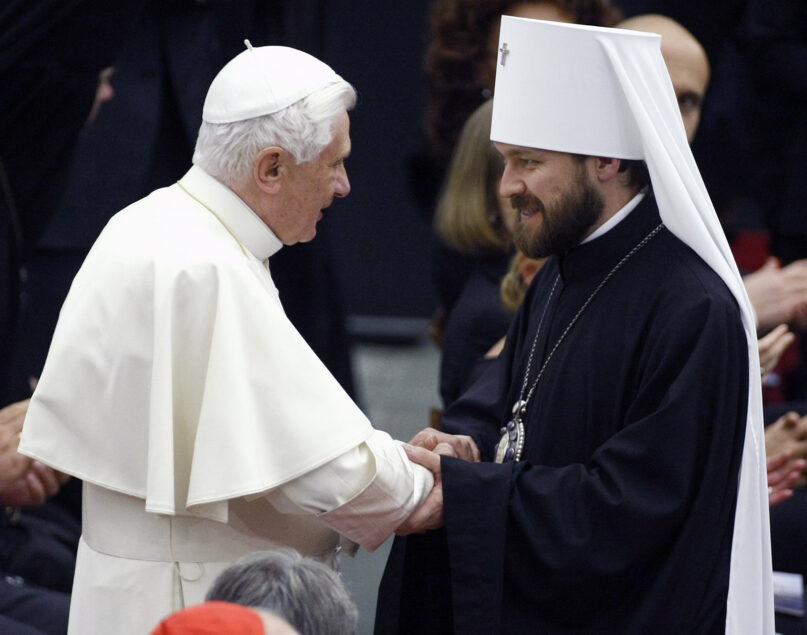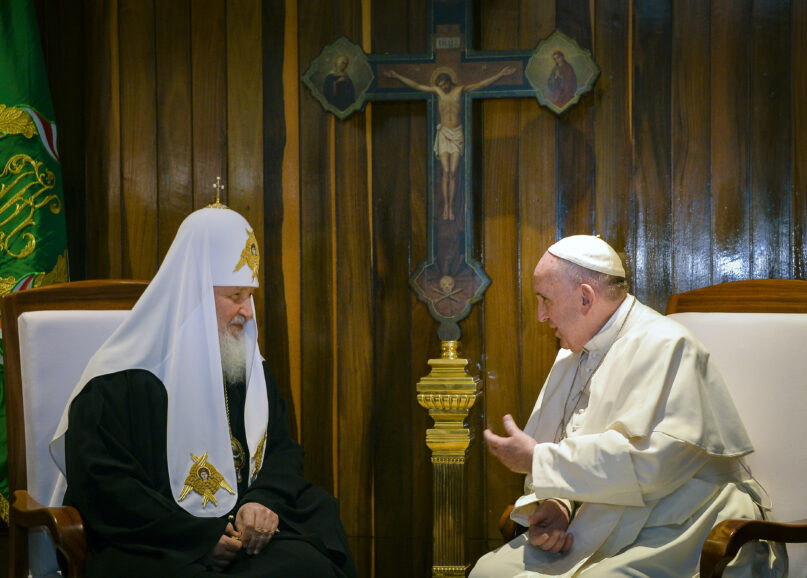
(RNS) — Diplomacy is back. At least, talk about negotiations to end the Russia-Ukraine war is finally in vogue, as the battlefield continues to tally losses.
But diplomacy has casualties, too, and one church diplomat whose career this war has claimed is Metropolitan Hilarion Alfeyev, once chairman of the Russian Orthodox Church’s powerful department for external church relations, effectively Patriarch Kirill’s foreign minister, in a conflict where religion has been wielded like a weapon.
Between 2009 and 2022, it was Hilarion’s job, among other unique responsibilities, to manage reconciliation with the Catholic Church. Under his guidance, the two Christian institutional giants genuinely deepened bonds, and Hilarion became personally close to both Pope Benedict XVI and Pope Francis.
With the start of the war, Hilarion lost his job, abruptly being demoted and sent to Budapest four months after Russia’s invasion of Ukraine. Then, last December, Hilarion was sidelined again: assigned to serve as a priest in a remote, albeit beautiful, Czech resort.
Staff at the Vatican’s Dicastery for Promoting Christian Unity mourn Hilarion’s absence. A dicastery priest, who requested anonymity, told RNS that positive institutional collaboration between the two faiths has shrunk drastically since the war began.
Earlier this year, I met Hilarion in Hungary, and he recalled for me the church and state breakthroughs that began the year 2009 for Russia and the Vatican.
In January, Kirill’s election as patriarch, succeeding Alexy II, known to be suspicious of the Catholic Church, was read as a positive augur for greater cooperation between Western and Eastern Christendom. Having served as chairman of external church relations for 20 years, he was already friendly with Vatican actors. Hilarion, age 42, bishop of Vienna and Austria, was appointed to replace Kirill in his foreign minister role.

Pope Benedict XVI, left, shakes hands with Hilarion Alfeyev, Metropolitan of Volokolamsk, chairman of the Department of External Church Relations and permanent member of the Holy Synod of the Patriarchate of Moscow, prior to a concert dedicated to the pontiff by Patriarch Kirill of Moscow, in the Paul VI Hall at the Vatican, May 20, 2010. (AP Photo/Pier Paolo Cito)
By December, the Holy See and Russia agreed to establish full diplomatic relations. Evidence of the new spirit was displayed in May 2010 when Kirill sponsored a concert in Vatican City, prepared by Hilarion, to honor Benedict’s birthday and fifth anniversary as pope. “I wholeheartedly thank Metropolitan Hilarion, for … his constant commitment to ecumenism,” Benedict said at the time. “I congratulate him on his artistic genius, which we have just had the opportunity to appreciate.”
Hilarion told me, “Immediately we became very good friends because, apart from church politics and Orthodox-Catholic relations, we also discovered a common passion for theology, first, and second, a common passion for music.” Hilarion was so inspired by Benedict’s “Jesus of Nazareth” trilogy that he wrote his own six-volume “Jesus Christ: His Life and Teaching,” which the pope emeritus called “a work of great importance.”
“The first half of my time as chairman was very optimistic and full of positive emotions because it was a time of great opening,” Hilarion told me.
Hilarion’s first meeting with Francis occurred the day after his enthronement, a sign of how important the Vatican considered its relations with the Russian Orthodox Church. “I was thinking, ‘Here’s a cardinal who was always in Argentina, never exposed to Orthodox-Catholic relations. Probably, I’ll have to explain some things to him from scratch,’” Hilarion recalled. “But that was not the case at all. He knew so much. He knew everything.”

In this Feb. 12, 2016, file photo, the head of the Russian Orthodox Church, Patriarch Kirill, left, and Pope Francis talk during their meeting at the Jose Marti airport in Havana. (Adalberto Roque/Pool photo via AP)
Hilarion went on to lay the groundwork for the historic February 2016 meeting between Francis and Kirill in Havana — the first ever between leaders of these two faiths. While crafting the document the two would sign in Havana, Hilarion said he was highly conscious of the near miss in 1997, when Pope John Paul II and Patriarch Alexy were scheduled to meet in Austria before disagreements over their communique caused the Russian church to cancel.
The Havana meeting, Hilarion said, “was not just a meeting of two heads of churches, it was also a meeting of two people, each with his own charisma, his own character, his own smile. It was clear that they liked each other, that they felt quite comfortable with each other.”
Hilarion soon brokered the temporary transfer to Russia of relics from St. Nicholas, patron saint of Russia and Greece, that had been kept in the Pontifical Basilica of Saint Nicholas, in Bari, Italy, since 1087.
“Patriarch Kirill said, ‘Ask for the head,’ so I repeated this request to the pope. He laughed and said, ‘If I tell the archbishop and Bari citizens that we are going to take the head of St. Nicholas, they will cut off my head!’” Part of the saint’s rib was sent instead.
Despite escalating frictions in Ukraine from 2014 on, the Catholic-Russian Orthodox bond remained strong, and in December 2021, Hilarion visited Francis to discuss a second meeting between the pope and patriarch. Hilarion brought a special gift: the pope’s book “Prayer, the Breath of New Life,” in Russian, with a preface by Kirill.
With the outbreak of war in February 2022 came rupture. Hilarion’s public statements centered on the human cost of conflict, but his statements contrasted with Patriarch Kirill’s, which were more deferential to political decision-makers.
In an Austrian TV documentary released in May of that year, Hilarion emphasized that Russian Orthodox faithful live in Ukraine as well as Russia. He warned the two sides to communicate, saying that otherwise “the conflict will not only deepen, but will be transformed into a global conflict, because the world became a powder keg.”
On June 7, the ROC’s Holy Synod removed Hilarion from his high-level post and transferred him to Budapest to lead a small diocese of approximately 3,000 believers. No official reason was given for the demotion.
Hilarion maintained contact with his global network, traveling on a Hungarian passport. In April 2023, he met Francis in Hungary. Hilarion explained: “No political issues were discussed. The meeting was personal, between two old friends.”
Francis told the media, “Hilarion is someone I respect very much, and we have always had a good relationship. And he was kind enough to come and see me, then he came to the Mass, and I saw him here at the airport as well.”
Last year, a 21-year-old Russian-Japanese Orthodox subdeacon, working in the Budapest diocese, George Suzuki, left Hungary abruptly after complaining of sickness. At the time, the subdeacon’s illness didn’t appear sinister. But shortly after he left, his Russian “mother” — a guesthouse manager in Okinawa, Japan (location of the largest U.S. air base in East Asia) — contacted the bishop’s office seeking almost 400,000 euro, allegedly for his treatment. She knew Hilarion personally because “she came several times and was always very demanding,” said the priest. “She asked for money for various purposes.”
Meanwhile, a church safe was discovered empty, missing money and valuables. Hungarian police reported that they had found Suzuki’s fingerprints and DNA. They issued an arrest warrant, but Japan has failed to extradite Suzuki. Hungarian police, who brought a case against the “mother” for extortion, informed Hilarion that she was actually Suzuki’s grandmother.
Months after charges were filed, a Western, anti-Putin media outlet began publishing Suzuki’s accusations against Hilarion, including sexual harassment, supposedly backed by short audio and video clips — determined by Russian experts to be fabricated.
Hilarion did not want to discuss the case with me, except to say: “The only real fact is that Suzuki is a thief. … This is the fact. All else are his accusations.”
Although the priests of Budapest diocese rallied around Hilarion, extolling his virtue, the ROC reassigned Hilarion to a church in Karlovy Vary, Czech Republic, forcing his retirement as bishop.
Hilarion told RIA Novosti, a Russian news agency, recently: “The past year was difficult for me. Enormous efforts were made to deprive me of the opportunity to serve the Church. Slander, blackmail, threats, and falsified evidence were used. But the Church protected me. I can continue to serve, preach, perform sacred sacraments, and stand before the throne of God. For this, I am grateful.”
Hilarion nonetheless periodically returns to Moscow, and on Feb. 1, he concelebrated the Divine Liturgy with Kirill to mark the 17th anniversary of the patriarch’s enthronement. He maintained contact with Francis until the pope’s final days.
(Victor Gaetan, a senior correspondent for the National Catholic Register, is the author of “God’s Diplomats: Pope Francis, Vatican Diplomacy, and America’s Armageddon” and a contributor to Foreign Affairs magazine. The views expressed in this commentary do not necessarily reflect those of RNS.)
